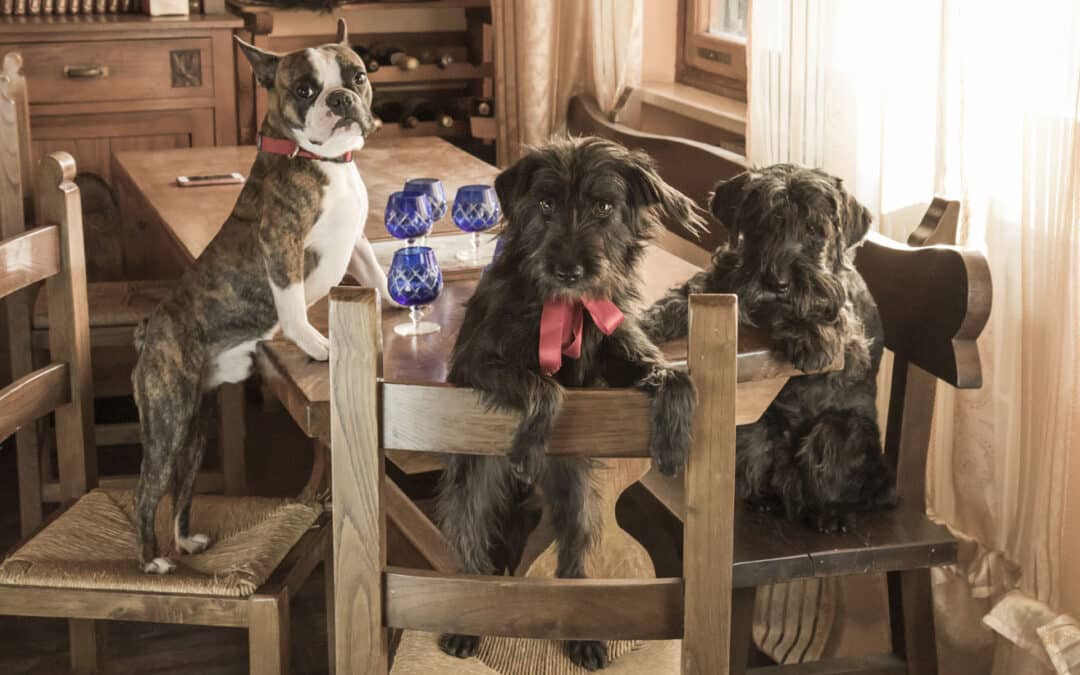Your Dog and the Holidays
I would venture to guess that, like me, you tend to give your dog a few table scraps, if they’re good dogs. Or am I the only person in the world that does this? I’ve been told not to do that and holiday food is “bad for your dog” and it will “shorten your pet’s life span”. I really have no way of determining that, but I will say that all of our dogs have lived well over 15 years and have always been healthy. Maybe it’s the occasional junk food my wife and I feed them. However, there are some things we do not feed our dogs, especially this time of the year. If you’re having guests over to your house for Thanksgiving and you have pets, please be aware of the foods that can be dangerous for them.
According to a myriad of articles on the web, dogs cannot eat certain foods. If you’re a dog person, you’re probably familiar with the foods that can be poisonous to dogs. Chocolate, onions, garlic, grapes, and raisins are just a few foods you need to keep away from your dog. With turkey day coming up, there are numerous foods that you’ll probably be serving that aren’t healthy for your pet. Shall we explore? Let’s!
Food That Can be Bad For Dogs
Turkey bones, as well as chicken bones, are very bad for dogs. In some cultures, chicken bones are passed on to their dogs. They’re dogs, not pigs. But nonetheless, the reason that it’s not good for them is not the nutritional value, rather the physical problems that can occur. Mostly splintering and getting stuck in your dog’s throat or worse, their digestive tract. I’ve heard from several of our clients over the years whose dogs had surgery to remove chicken bones from their digestive tract. I got lucky. My lab, when she was 15 years old, discovered a half a bucket of KFC in the trash and had downed the contents within a few minutes. She was 15! And she seemed to enjoy it. Nothing happened to her though, thankfully.
How about chocolate? That’s probably the most talked about concern when it comes to dogs and the human foods they consume. Chocolate and other sweets can be bad for your dog. Chocolate can be deadly, as can sugar substitutes found in some chocolate. If your pet picks up a scrap of chocolate that found its way on the floor, should you panic? I wouldn’t. Just keep an eye on your pet for a few hours to make sure they’re OK. Most of the time they will be. How about a box of chocolate that didn’t find its way on the floor but was acquired by your large dog who “accidently” jumped up on the table and confiscated the tasty treats? You might want to contact your vet on that one.
It’s been said that overly seasoned foods are bad for your pet. This may be. Our dogs don’t seem to mind. Culturally, our dogs have been given spicy foods as they were dropped on the ground and one of our dogs seems to love hot and spicy foods. The other one, not so much. I’ve never seen a dog eat a Jalapeno and did not seem to mind, but acted like he wanted more. But that’s just our dogs. I wouldn’t recommend anyone giving their dogs Hot Cheetos.
A Little Dog Food History
According to the Pet Food Institute, the first commercially produced dog food was introduced in 1860 and the following year, we had a war over it. OK, my history may be a little skewed. Anyway, the first extruded kibble, like most dog foods today, was produced in 1956, surprisingly, by the same company, although acquired by General Mills 6 years earlier. So, what were dogs fed before all this? Leftovers, table scraps, live food – read that, vermin.
Now don’t get the wrong idea from me. I realize that some commercially produced foods for your pets have more nutritional value than junk food and table scraps. In this country, we tend to spoil our pets a bit and this is one way we spoil ours. But even with their soulful eyes staring at us like they haven’t had an ounce of food in weeks, we still need to keep it in moderation. After all, it’s Thanksgiving and we’re thankful for our pets and want to spoil them just a little.


Trackbacks/Pingbacks